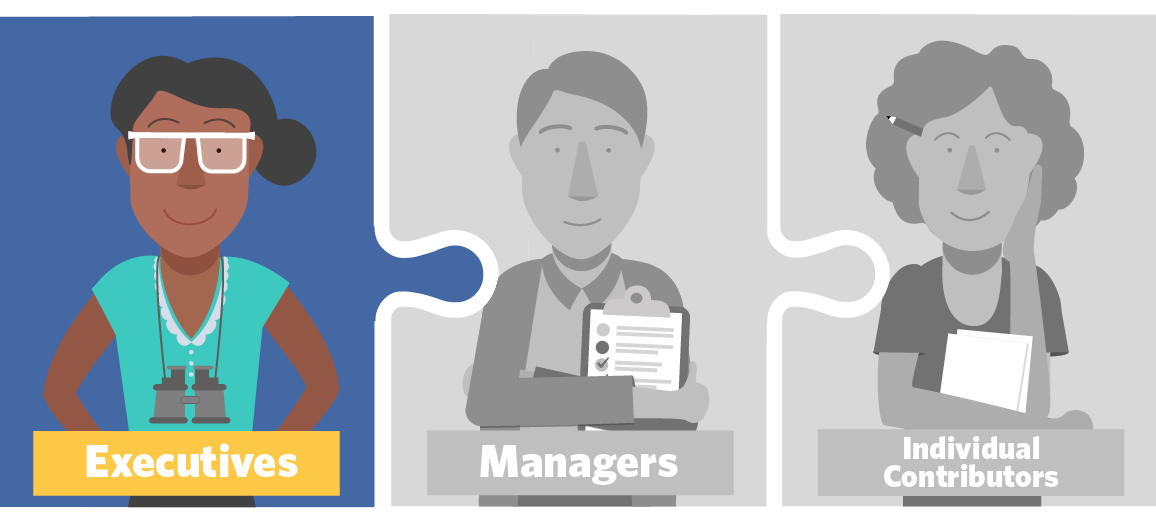Coaching is a critical element of today’s workplace. According to Generation Z, it’s the number one trait of a good manager. But training managers on a coaching approach is just the start of a successful, lasting coaching initiative. To make it stick, you need a coaching culture.
And to impact culture, you’ll need executive support. More than that, executives need to be an integral part of the coaching process. They should be as familiar with coaching as any people leader—if not more so.
This isn’t as overwhelming as it may seem. Start by illustrating the benefits of organization-wide coaching—for executives personally and for the organization as a whole. Illustrate the business case as to why building a coaching culture is the right strategy that will drive high performance throughout the organization.
More than ¼ of HR feel that executives and managers are the ones who actually benefit the most from the results of coaching programs.
5 Executive Benefits of a Coaching Culture
-
Coaching drives strategic priorities. Many executives recognize the “soft” benefits of coaching, but coaching also drives bottom-line results on strategic priorities including profitability, productivity, organizational goal, engagement, and retention.
-
Executives will see fewer turnover costs. Speaking of retention, coaching has been shown to decrease attrition rates of employees, and subsequently save the organization from the associated costs. Organizations that have coaching programs have found that their employees often stay 40% longer than employees in organizations that do not have coaching programs.
-
Executives will see capabilities being built. Imagine the impact you’d see in your organization if every employee, from underperformers to employee of the year, increased their skills and capacity by 10 percent. Done right, coaching helps every member of the organization take ownership of results and improve their capacity and performance. Employees are more engaged in learning and developing new, relevant skills to contribute to the organization’s bottom line.
-
Executives will witness stronger succession planning. One aspect of coaching that especially benefits executives is the way coaching helps managers perform better in the role of manager, as well as prepare future managers for the role. A major concern in many organizations is fear of promoting individuals to posts that they are unqualified for and overwhelmed by. Coaching helps to prepare leaders before they step into their roles and helps them to more quickly adapt to those roles once they do. This means that executives are filling these roles with skilled, adaptable, capable individuals who are able to fulfill their role full. Leaving executives with a great deal less to worry about.
-
Executives will see bottom-line results—culturally and financially. Coaching will increase employee engagement and productivity throughout the organization. This will reflect in goals being reached and exceeded, operations running more smoothly, and more things being done well, but still in less time than before. Executives will see the effects of these changes through stronger bottom-line results.
Coaching’s impact on engagement
It is this last point that may be the most powerful result of implementing a coaching program. It may also be the most easily visible to executives within your organization, whose role it is to ensure that the organization as a whole runs smoothly.
Employee engagement is the key to a smoothly running organization. Coaching programs have been seen to measure 24% higher in employee engagement. While an executive may not see that on an employee-by-employee basis, they do see it in the increase productivity that happens throughout the company as a result. After all, a coaching program may help individuals, but a coaching culture helps the entire organization.
This engagement, and the resulting productivity, comes as coaching programs give employees the opportunity to have a voice in the organization. And as the well-known adage states, people love, and in this case, engage in, what they help create. An organization with employees who are not engaged in helping the organization, may still progress, but with employees who are engaged, the organization will thrive.
In the end, it is understandable that your executives are concerned about whether to proceed with an organization-wide coaching program. But the benefits are in no way limited to the six listed above, and with your help, your executives will see all of those benefits and more.
Executive development is critical for culture change
Coaching programs that have executive buy-in are more successful than coaching programs without. In fact, organizations with robust coaching cultures are more than 60% more likely to have senior leaders involved in their coaching system.
Executive involvement is more than just a seal of approval or lip service in a company meeting. Senior leaders need to model coaching as a priority in the organization. To do this, they need to know how to coach the same way their people leaders do—so everyone is speaking the same language. Building this muscle will take dedicated effort, but with all the aforementioned benefits of a coaching culture, your executives can be motivated to make it a priority.
Learn more about building a coaching culture in this ebook.
{{cta(‘a7354adc-62ef-4b28-ba28-4a4440bb5023’)}}


